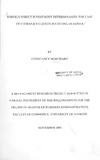| dc.description.abstract | In recent times, the importance of Foreign Direct Investment has taken a new dimension.
Debate among academics and policy makers has shifted from whether or not countries
should attract FDI to how countries can attract and reap the full benefits that come with
FDI. The benefits of FDI include serving as a source of capital, employment creation,
technology transfer, to mention a few. As expected, the answer to the question "why is
FDI important to a country" will depend on the needs of the country. The role of FDI as a
source of capital has become increasingly important to Sub-Saharan Africa (SSA).
The empirical literature on the determinants of FDI to developing countries has generally
focused on identifying the location-specific factors that are relevant for FDI to
developing countries with only a few African countries in their sample. With regards to
research on the determinants of FDI to Africa, there appears to be a dearth of literature.
This study had two primary objectives:
1. To identify factors that influence Foreign Direct Investment growth in Kenya
2. To evaluate foreign investor perspective on adequacy of incentives offered.
To facilitate this study, a list of 54 companies with a global banking relationship with
Citibank was obtained. These were multinational firms. Only 25 respondents agreed to
participate in the study, with the rest saying their policies are too protracted to allow them
participate. Of those who did not respond, the time frame was too short, whereas others
needed to seek information from their head office. A semi-structured questionnaire was emailed delivered to relevant senior managers in
the companies. Data collected was analyzed using descriptive statistics such as
summarized tabulations, percentages, frequencies, and rankings.
The results show there is high level of sophistication with the foreign investors with
diverse needs. A large number of them are aware of the incentives given to attract foreign
investments. However, they are also aware that the incentives provided are not
sufficiently adequate to attract higher levels of capital and equity investments.
The findings also show that many investors view Kenya as a potential economic giant
with market growth opportunities, especially given its strategic location and the new
government's willingness to enhance investments.
Major conclusion arrived at is for the government to go back to the drawing board and
restructure the incentives especially taxation. They should also work closely with the
private sector in a bid to monitor changing patterns of Foreign Direct Investment in the
emerging markets. The challenge is for the government to create an enabling
environment. | en |

